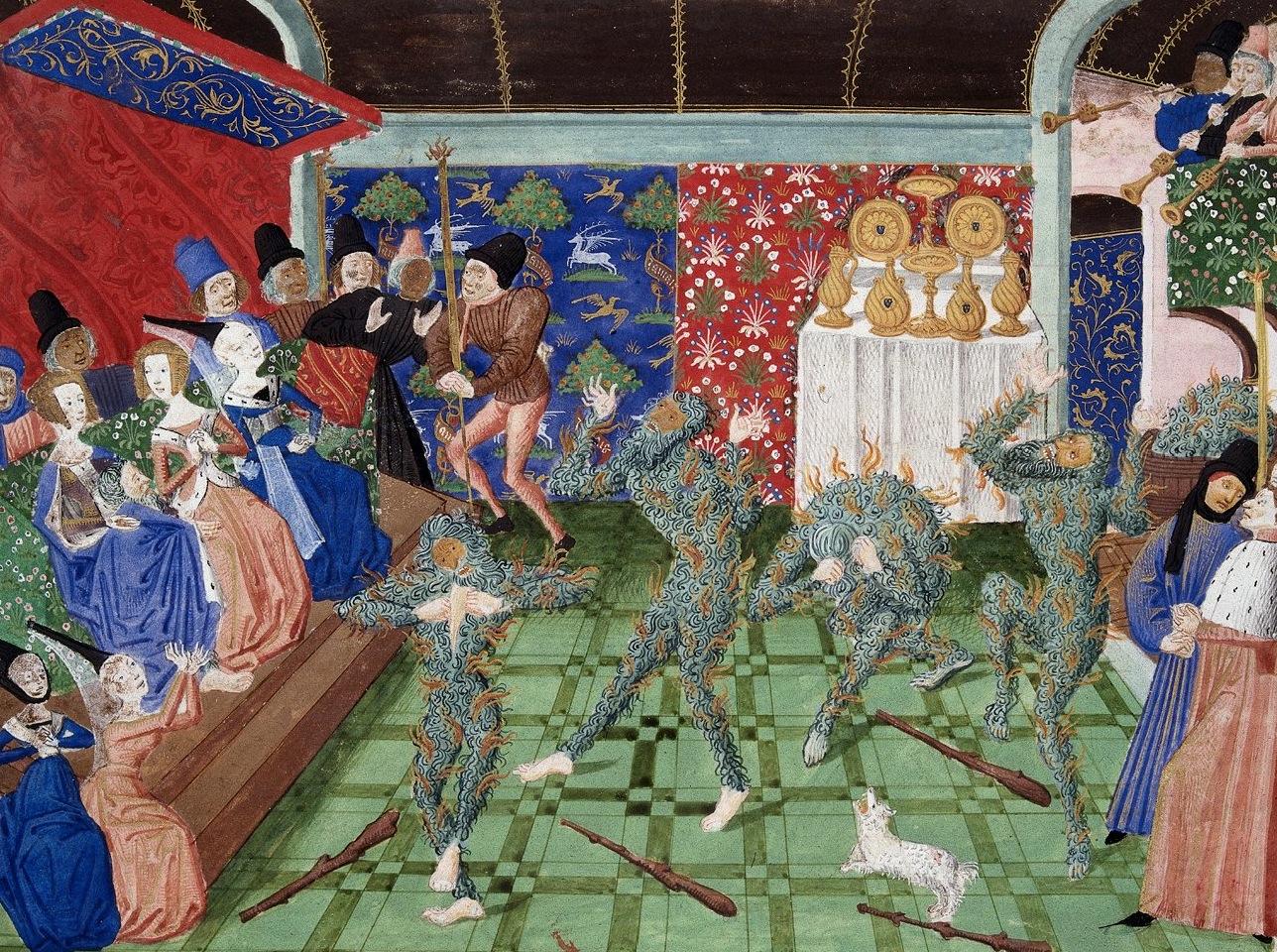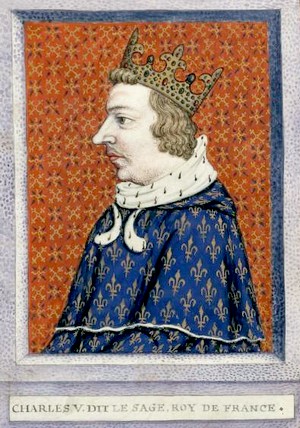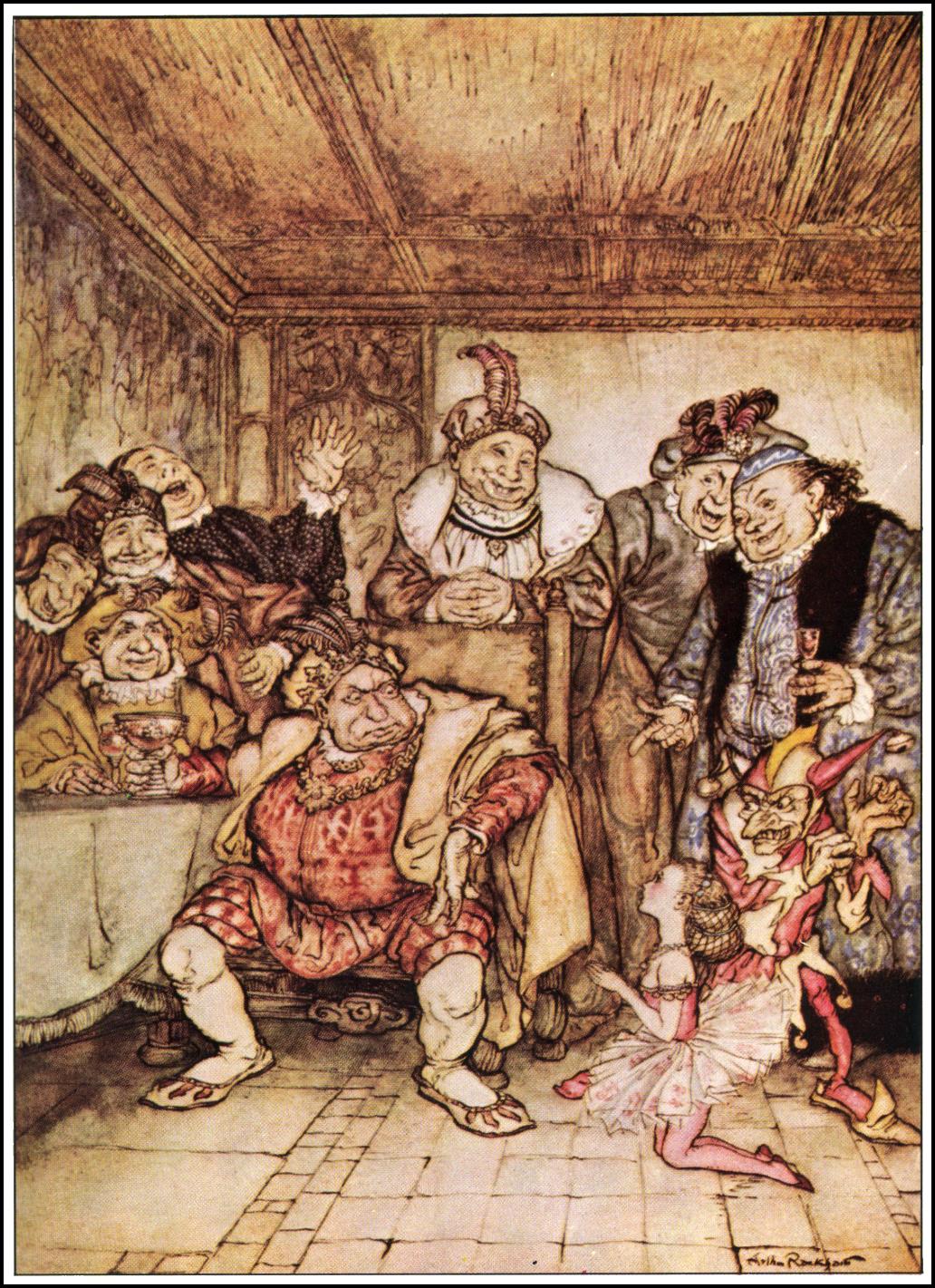|
Bal Des Ardents
The ''Bal des Ardents'' (Ball of the Burning Men), or the ''Bal des Sauvages'' (Ball of the Wild Men), was a masquerade ballSources vary whether the event was a masquerade or a masque. held on 28 January 1393 in Paris, France, at which King Charles VI had a dance performance with five members of the French nobility. Four of the dancers were killed in a fire caused by a torch brought in by Louis I, Duke of Orléans, the king's brother. The ball, held at the royal palace of Saint-Pol, was one of a series of events organised to entertain Charles, who had suffered an attack of insanity in the previous summer of that year. The circumstances of the fire undermined confidence in the king's capacity to rule; Parisians considered it proof of courtly decadence and threatened to rebel against the more powerful members of the nobility. The public's outrage forced Charles and his brother Orléans, whom a contemporary chronicler accused of attempted regicide and sorcery, to offer penance ... [...More Info...] [...Related Items...] OR: [Wikipedia] [Google] [Baidu] |
Michel Pintoin
Michel Pintoin (c. 1350 – c. 1421), known as the Chronicler of Saint-Denis, the Monk of Saint-Denis or Religieux de Saint-Denis was a French Monk cantor, and chronicle writer best known for his history of the reign of Charles VI of France.Curry, 100 Anonymous for many centuries, in 1976 the Monk was tentatively identified as Michel Pintoin, although scholars continue to refer to him as the Monk or the Religieux.Veenstra, 22 The Monk of St Denis Michel Pintoin has been identified as a monk at the Basilica of St Denis, an abbey which had a reputation for writing chronicles. The monks at St Denis were considered the official chroniclers of the Valois kings and were given access to official documents. Because he witnessed many of the events of the Hundred Years War, the Monk of St Denis is considered a valuable chronicler of this period. His history of the reign of Charles VI, titled ''Chronique de Religieux de Saint-Denys, contenant le regne de Charles VI de 1380 a 1422'', ... [...More Info...] [...Related Items...] OR: [Wikipedia] [Google] [Baidu] |
Robert Knecht
Robert Jean Knecht (20 September 1926 – 4 November 2023) was a British historian, an expert on 16th-century France, and Emeritus Professor of French history at the University of Birmingham, where he taught during 1956–1994. Biography The only child of French parents living in London, Knecht was educated at the French Lycée in London and the Salesian College, Farnborough. He graduated at King's College London in 1948 and qualified as a teacher in 1949. In 1953 he was awarded the M.A. degree of London University for which he submitted a thesis on Cardinal John Morton and his episcopal colleagues. Knecht was then employed by a firm of industrial designers to collect and exhibit old prints and to write explanatory booklets for three theme pubs in London. In 1954 he carried out research on MPs in the Cinque Ports for the early Tudor volume of the History of Parliament and wrote the chapter on schools in Salisbury during the 19th century for the Victoria County History. Though t ... [...More Info...] [...Related Items...] OR: [Wikipedia] [Google] [Baidu] |
Jeanne Of Bourbon
Joanna of Bourbon (''Jeanne de Bourbon''; 3 February 1338 – 6 February 1378) was Queen of France by marriage to King Charles V. She acted as his political adviser and was appointed potential regent in case of a minor regency. Life Early life Born in the Château de Vincennes, Joanna was a daughter of Peter I, Duke of Bourbon, and Isabella of Valois, a half-sister of Philip VI of France. From October 1340 through at least 1343, negotiations and treaties were made for Joanna to marry Amadeus VI, Count of Savoy. The goal was to bring Savoy more closely into French influence. Following this, she was betrothed to Humbert, Dauphin of Viennois, which also fell through. Queen On 8 April 1350, Joanna married her cousin, the future Charles V of France, at Tain-l'Hermitage. Since they were first cousins once removed, their marriage required a papal dispensation. Born thirteen days apart, they both were 12 years old. When Charles ascended the throne in 1364, Joanna became queen of ... [...More Info...] [...Related Items...] OR: [Wikipedia] [Google] [Baidu] |
Louis II, Duke Of Bourbon
Louis de Bourbon, called the Good ( – 1410), was the third Duke of Bourbon. He was also the Count of Clermont-en-Beauvaisis and Lord of Beaujeu. Life Louis was the son of Peter de Bourbon and Isabella de Valois. His mother was the sister to King Philip VI of France. He inherited the duchy after his father Duke Peter I died at the Battle of Poitiers in 1356. In 1390, Louis launched the Barbary Crusade against the Hafsids of Tunis, in conjunction with the Genoese. Its objective was to suppress piracy based in the city of Mahdia, but the siege was unsuccessful. Louis died at Montluçon in 1410, at the age of 73. Marriage and issue On 19 August 1371 Louis married Anne of Auvergne (1358–1417), Countess of Forez and daughter of Beraud II, Dauphin of Auvergne, and his wife the Countess of Forez Forez (; ) is a Provinces of France, former province of France, corresponding approximately to the central part of the modern Loire (department), Loire ''département in Fra ... [...More Info...] [...Related Items...] OR: [Wikipedia] [Google] [Baidu] |
John, Duke Of Berry
John of Berry or John the Magnificent (French language, French: ''Jean de Berry'', ; 30 November 1340 – 15 June 1416) was Duke of Berry and Rulers of Auvergne, Auvergne and Count of Poitiers and Montpensier. His brothers were King Charles V of France, Duke Louis I of Anjou and Duke Philip the Bold of Burgundy. He was Regent of France from 1380 to 1388 during the minority of his nephew Charles VI of France, Charles VI. John is primarily remembered as a collector of the important illuminated manuscripts and other works of art commissioned by him, such as the . His personal motto was ''Le temps venra'' ("the time will come"). Biography John was born at the castle of Vincennes on 30 November 1340, the third son of King John II of France and Bonne of Luxembourg. In 1356, he was made Count of Poitou by his father, and in 1358 he was named king's lieutenant of Auvergne (province), Auvergne, Languedoc, Périgord, and Poitou to administer those regions in his father's name while t ... [...More Info...] [...Related Items...] OR: [Wikipedia] [Google] [Baidu] |
Philip The Bold
Philip II the Bold (; ; 17 January 1342 – 27 April 1404) was Duke of Burgundy and ''jure uxoris'' Count of Flanders, Artois and Burgundy. He was the fourth and youngest son of King John II of France and Bonne of Luxembourg. Philip was the founder of the Burgundian branch of the House of Valois. His vast collection of territories made him the undisputed premier peer of the Kingdom of France and made his successors formidable subjects, and later rivals, of the kings of France. Philip played an important role in the development of gunpowder artillery in European warfare, making extensive and successful use of it in his military campaigns. By political marriage, from 1384 Philip gained control over Flanders, one of the most wealthy provinces of Europe in that time. He and his successors ruled it until 1482. This period is referred to as the Burgundian Netherlands. Early life Philip was born in Pontoise in 1342 to John and Bonne of Luxembourg. His father, John, was the ... [...More Info...] [...Related Items...] OR: [Wikipedia] [Google] [Baidu] |
Louis I, Duke Of Anjou
Louis I, Duke of Anjou (23 July 1339 – 20 September 1384) was a French prince, the second son of John II of France and Bonne of Bohemia. His career was markedly unsuccessful. Born at the Château de Vincennes, Louis was the first of the Angevin branch of the Valois royal house. His father appointed him Count of Anjou and Count of Maine in 1356, and then raised him to the title Duke of Anjou in 1360 and Duke of Touraine in 1370. He fought in the Battle of Poitiers (1356), in which his father the king was captured by the English. In 1360, he was one of a group of hostages the French surrendered to the English in exchange for the king. He escaped from England, after which his father felt bound in honour to return to English custody, where he later died. In 1382, as the adopted son of Joanna I of Naples, he succeeded to the counties of Provence and Forcalquier. He also inherited from her a claim to the kingdoms of Naples and Jerusalem. He was already a veteran of the Hund ... [...More Info...] [...Related Items...] OR: [Wikipedia] [Google] [Baidu] |
Regent
In a monarchy, a regent () is a person appointed to govern a state because the actual monarch is a minor, absent, incapacitated or unable to discharge their powers and duties, or the throne is vacant and a new monarch has not yet been determined. The rule of a regent or regents is called a regency. A regent or regency council may be formed ''ad hoc'' or in accordance with a constitutional rule. ''Regent'' is sometimes a formal title granted to a monarch's most trusted advisor or personal assistant. If the regent is holding the position due to their being in the line of succession, the compound term '' prince regent'' is often used; if the regent of a minor is their mother, and she is wife or widow of the king, she would be referred to as ''queen regent''. If the formally appointed regent is unavailable or cannot serve on a temporary basis, a may be appointed to fill the gap. In a monarchy, a regent usually governs due to one of these reasons, but may also be elected to ... [...More Info...] [...Related Items...] OR: [Wikipedia] [Google] [Baidu] |
Charles V Of France
Charles V (21 January 1338 – 16 September 1380), called the Wise (; ), was King of France from 1364 to his death in 1380. His reign marked an early high point for France during the Hundred Years' War as his armies recovered much of the territory held by the English and successfully reversed the military losses of his predecessors. Charles became regent of France when his father John II of France, John II was captured by the English at the Battle of Poitiers in 1356. To pay for the defense of the kingdom, Charles raised taxes. As a result, he faced hostility from the French nobility, nobility, led by Charles II of Navarre, Charles the Bad, List of Navarrese monarchs, King of Navarre; the opposition of the French bourgeoisie, which was channeled through the Estates General (France), Estates-General led by Étienne Marcel; and with a peasant revolt known as the Jacquerie. Charles overcame all of these rebellions, but in order to liberate his father, he had to conclude the Treaty ... [...More Info...] [...Related Items...] OR: [Wikipedia] [Google] [Baidu] |
Hop-Frog
"Hop-Frog" (originally "Hop-Frog; Or, the Eight Chained Ourang-Outangs") is a short story by American writer Edgar Allan Poe, first published in 1849. The title character, a person with dwarfism taken from his homeland, becomes the jester of a king particularly fond of practical jokes. Taking revenge on the king and his cabinet for the king's striking of his friend and fellow dwarf Trippetta, he dresses the king and his cabinet as orangutans for a masquerade. In front of the king's guests, Hop-Frog murders them all by setting their costumes on fire before escaping with Trippetta. Critical analysis has suggested that Poe wrote the story as a form of literary revenge against a woman named Elizabeth F. Ellet and her circle. Plot summary The court jester Hop-Frog, "being also a dwarf and a cripple", is the much-abused "fool" of the unnamed king. This king has an insatiable sense of humor: "he seemed to live only for joking". Both Hop-Frog and his best friend, the dancer Trippett ... [...More Info...] [...Related Items...] OR: [Wikipedia] [Google] [Baidu] |
Edgar Allan Poe
Edgar Allan Poe (; January 19, 1809 – October 7, 1849) was an American writer, poet, editor, and literary critic who is best known for his poetry and short stories, particularly his tales involving mystery and the macabre. He is widely regarded as one of the central figures of Romanticism and Gothic fiction in the United States and of early American literature. Poe was one of the country's first successful practitioners of the short story, and is generally considered to be the inventor of the detective fiction genre. In addition, he is credited with contributing significantly to the emergence of science fiction. He is the first well-known American writer to earn a living exclusively through writing, which resulted in a financially difficult life and career.. Poe was born in Boston. He was the second child of actors David Poe Jr., David and Eliza Poe, Elizabeth "Eliza" Poe. His father abandoned the family in 1810, and when Eliza died the following year, Poe was taken in by ... [...More Info...] [...Related Items...] OR: [Wikipedia] [Google] [Baidu] |





